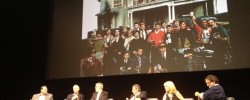
This Week on Demand: 10/02/2013
Wisely continuing the recent trend of boosting the Asian cinema catalogue, Netflix this week brings us a batch of films from Thailand, Taiwan, Korea, and New York’s Chinatown, offering a range of alternate romance stories and spectacular sci-fi thrills. The English-language selection, by contrast, is in considerably short supply this week, though nicely divided between big-budgeted action and low-budgeted drama to cater to a range of needs. It’s a far cry indeed from the best selection we’ve seen but treasure, as ever, awaits those willing to seek it out.
Bangkok Love Story
Debut director Poj Arnon contributes to the gangster genre one of its most fascinating specimens with Bangkok Love Story, a lushly photographed tale of the increasingly intimate relationship that develops between a world-weary assassin and the innocent man he refuses to execute. The generic tropes Arnon institutes and subsequently undermines attest the film’s astonishing ability to tailor dominant ideals of screen masculinity to its own subversive ends; indeed, the manner in which the narrative slyly slips from a tone of balls-to-the-wall action to what would once upon a time have been deemed “women’s picture” and back again is a remarkable ironic reworking of familiar cinematic treatments of gender and sexuality. Though perhaps at times deleteriously amusing in its excess, what could easily be mistaken for haplessly overwrought melodrama in the script is, in fact, a potent reworking of recognisable tropes to question our acceptance of individuals existing outside the sphere of hetero-normative life. RECOMMENDED.
Compliance
Less assured—and arguably even problematic—in its sexual politics is Compliance, the first feature from writer-director Craig Zobel. Based on the true-life case of a fast-food restaurant prank caller who posed as a police officer and convinced management that a member of staff had been accused of stealing, it’s earned considerable controversy for its presentation of the events that ensue, interpreted by many as exploitative. Despite the promising technical skill Zobel exhibits and the impressive work of his cast—Ann Dowd is excellent as the morally conflicted manager—it is a concern that overrides the movie in some respects: at best, its motivations are questionable, the purported exposition of humanity’s dangerous deferral to authority undermined by the reality that this case was the only one among many dozens to be taken so worryingly far. Part-failure though it is, Compliance does make for an intriguing watch, even if only for the questions it raises on the ethics of dramatisation. WORTH WATCHING.
Doomsday Book
More often the territory of horror, the anthology film turns to sci-fi with Doomsday Book, a terrifically entertaining threesome of apocalyptic tales from Korean directors Jee-woon Kim and Pil-Sing Yim, who helmed the first and last sequences after funding issues offset the latter’s original conception and shelved the project for two years. Kim’s is the best of the bunch, a philosophically rich and eventually quite profound story that examines the implications of artificial intelligence through the lens of Buddhist teaching. Yim’s segments are more comically-oriented—giving the film as a whole an oddly effective tonal structure despite its stark contrasts—using zombies and meteorites as gateways to savvy satires on society and the media, the latter of which offers a handful of hysterical laughs. Pristine production values—all three segments are visually extraordinary—aid the deft balance of irreverent fun and intellectual stimulation, making Doomsday Book a film as thought-provoking as it is entertaining. HIGHLY RECOMMENDED.
Happy Birthday
Addressing a number of key issues faced by the gay community today, Yen Tan’s self-financed debut feature cuts between the stories of five people with a shared birth date as they deal with various difficulties their sexuality and society’s reaction thereto bring. Dramatically engaging in concept and content, it’s in Tan’s hopelessly inexperienced execution that Happy Birthday disintegrates, the basic audio and video qualities poorly capturing what are, for the most part, demonstrably amateur performances. While each of the five segments captures an affecting character arc, such is the disengagement incurred by the production’s evident lack of resources that it’s impossible to stay involved in any of the storylines, the consistently unconvincing line deliveries as distancing as is the desperately uninteresting monochrome photography. Redeemed only by the honourable intentions discernible in the script, ill-served as they are, Happy Birthday is a sad disaster of a movie, a fine concept lost in hapless direction. AVOID IT.
The Raven
Following in the wake of Guy Ritchie’s considerable steampunk success with Sherlock Holmes and its sequel, James McTeigue makes
a modern action hero of Edgar Allen Poe, pitting the legendary author against a copycat killer inspired by his gruesome Gothic tomes. Taking inspiration from the mysterious circumstances of Poe’s death, The Raven casts John Cusack as a wisecracking, alcoholic incarnation of the famous poet, the death of his great love several years prior rendering him little more than a shadow of his former self. Surrounded by a leaden supporting cast, Cusack is left mostly to carry the film alone, a task made all the more difficult by the script’s dreadful efforts to embellish the character with the same wit and verbosity as his prose. Only McTeigue’s able handling of the appealingly bloody action set pieces elevate The Raven above the level of patent nonsense, and even then only by inches. SO-SO.
The Unseeable
A traditional haunted house horror with a Thai twist, The Unseeable concerns Nualjan, a pregnant young woman who encounters the large estate that will serve as the film’s setting while searching for her missing husband. Evidently not a fan of the genre herself, she accepts the housekeeper’s invitation to stay the night despite the immediate plethora of ghostly tropes she encounters immediately upon arrival, failing to recognise the disappearing figures and strange noises as signs she should probably excuse herself politely and find somewhere else to sleep. It’s a film that would have seemed dated five decades ago, its only link to the modern age the abundant overuse of jump scares that—of course—prompt more sighs than scares. Already deprived of all credibility it ever managed to accrue, the film unsurprisingly concludes on a fitfully fatuous note, its supposedly shocking series of final reveals confusing the narrative yet further as it hastens to make use of the many leftover jump scares. AVOID IT.
Too Young to Die
Courting considerable controversy in its native South Korea not only for its flagrant depiction of intimate sexual activity, but for the fact that the acts presented occur between a septuagenarian couple, Too Young to the Die’s atypical love story puts the elderly on screen in a way rarely seen. Its stars are Sun-ye Lee and Chi-gyu Park, the real couple whose courtship in their mutual eighth decade inspired the film’s production. An impressively empowering piece of work, it’s a film that determinedly shows these lovers to possess all the sexuality and stamina as those fifty years their junior. Troubled as it is by the crudely manufactured tension a handful of artificial arguments offer, this is an admirable depiction of a sort of romance often unfairly excluded from cinema. Director Jin-pyo Park makes us privy to their passion with a number of unbroken shots—the longest is seven minutes—simply observing their intercourse as a congress no less worthy of attention than that of youth. WORTH WATCHING.
Year of the Fish
Rotoscoping is one of the most interesting aesthetic techniques there is, its uncanny blend of live-action and animation allowing it dual residence in the realms of fantasy and reality. At its best, it can question the tenets of human consciousness and memory, as in masterworks the like of Waking Life and Waltz with Bashir. In Year of the Fish, however, it seems little more than a convenient way to obfuscate botched make-up jobs. A retelling of Cinderella in the modern-day context of New York’s Chinatown, the film’s only advantageous use of its chief visual conceit is the verisimilitude it allows between the social realism of the illegal immigrant experience and the fairytale structure of the central narrative with its more eccentric characters. Writer/director David Kaplan never matches that aesthetic cohesion in his storytelling, his flailing efforts to collude the simplistic fantasy of the source with the serious issues of this new context leaving Year of the Fish a tonally hysterical mess. AVOID IT.
Related Posts
Ronan Doyle
Latest posts by Ronan Doyle (see all)
- TIFF’s TOGA! The Reinvention of American Comedy Review: Airplane! (1980) - August 8, 2013
- Locarno Review: The Dirties (2013) - August 8, 2013
- This Week on Demand: 04/08/02013 - August 7, 2013
-
http://www.facebook.com/people/Chris-D-Misch/28134555 Chris D. Misch








































